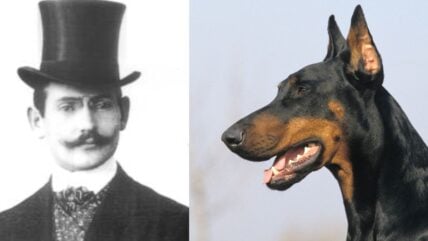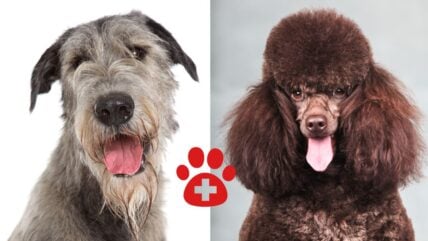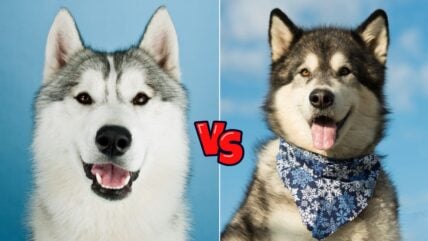Wolfdog vs. Wolf: How to Tell the Difference Between a Hybrid and the Real Thing
What is a Wolf Dog? Wolf Dogs—or Wolfdogs—are hybrid canids with any combination of domestic dog breed and wild wolf parentage. True Wolf Dogs have recent wolf ancestry, but there are varieties of deliberately bred and recognized wolf dog hybrids that have less recent wolf ancestry. Dogs and wolves are able to produce viable offspring because they are the same species, and domestic dogs (Canis lupus familiaris) are actually a subspecies of wolf.

Wolfdogs found in the United States are typically a cross of Gray Wolf (Canis lupus) and domestic dog breeds like German Shepherd Dogs and Siberian Huskies. These wolf hybrids are referred to simply as “Wolfdogs” but official “Wolf Dog breeds” also exist and have distinguishing names.
When categorizing Wolf Dogs, DNA testing is only one part of a larger picture. Experts and Wolfdog sanctuaries use a combination of ancestry, physical traits, and behavioral traits to sort Wolfdogs into one of four categories.
| Wolfdog Categorization | ||||
| No-Content Wolfdog | Low-Content Wolfdog | Mid-Content Wolfdog | High-Content Wolfdog | |
| Recent Wolf Ancestry? | No | Yes | Yes | Yes |
| Genetic Makeup | ~100% domestic dog | Mostly domestic dog, low percentage wolf | Assumed to be half dog, half wolf | Mostly wolf, low percentage domestic dog |
| Behavior | Most similar to domestic dogs | Some wolf-like traits | Wolf-like traits | Many wolf-like traits |
| Appearance | Some wolf-like traits | Many wolf-like traits | Many wolf-like traits | Hard to distinguish from pure wolf |
Meet 5 Wolf Dogs From Instagram
Some wolf-dog hybrids are almost indistinguishable from wild wolves, which contributes to the appeal for many Wolfdog owners.
1. Faelen & Maeve
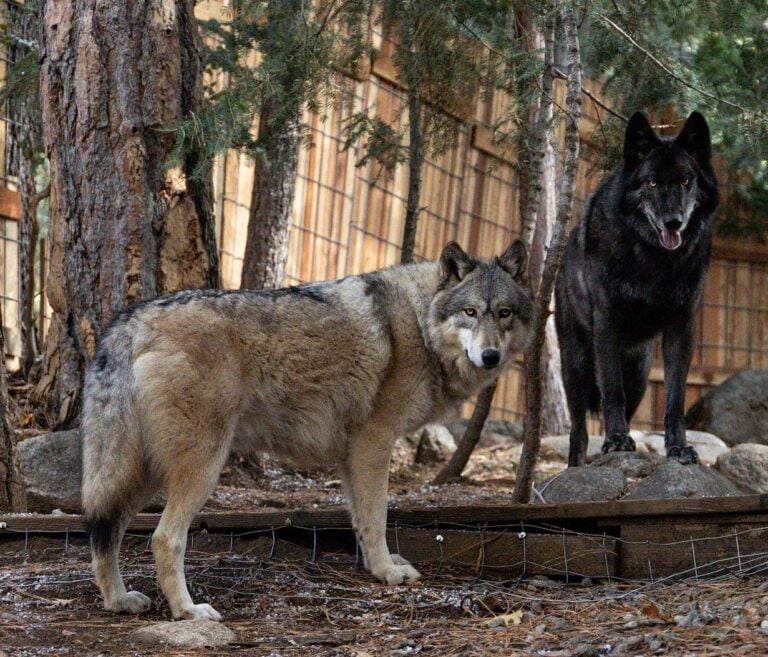
Faelen (right) and Maeve (left) are two Wolfdogs living at Mission:Wolf sanctuary in Colorado.
Faelen is now 5, and his biography says that he was previously owned by a family and that “as a puppy and young adult, Faelen was a very calm and easygoing Wolfdog.” However, “upon maturity, he became markedly more intense, shy, and selective about human company” and came to live at Mission:Wolf.
Maeve is 3, was owned by the same family, and came to Mission:Wolf in 2023 with Faelen. Maeve has a more laid-back personality, and her biography says that she “has always been a very outgoing, confident, and adventurous Wolfdog.”
2. Archer
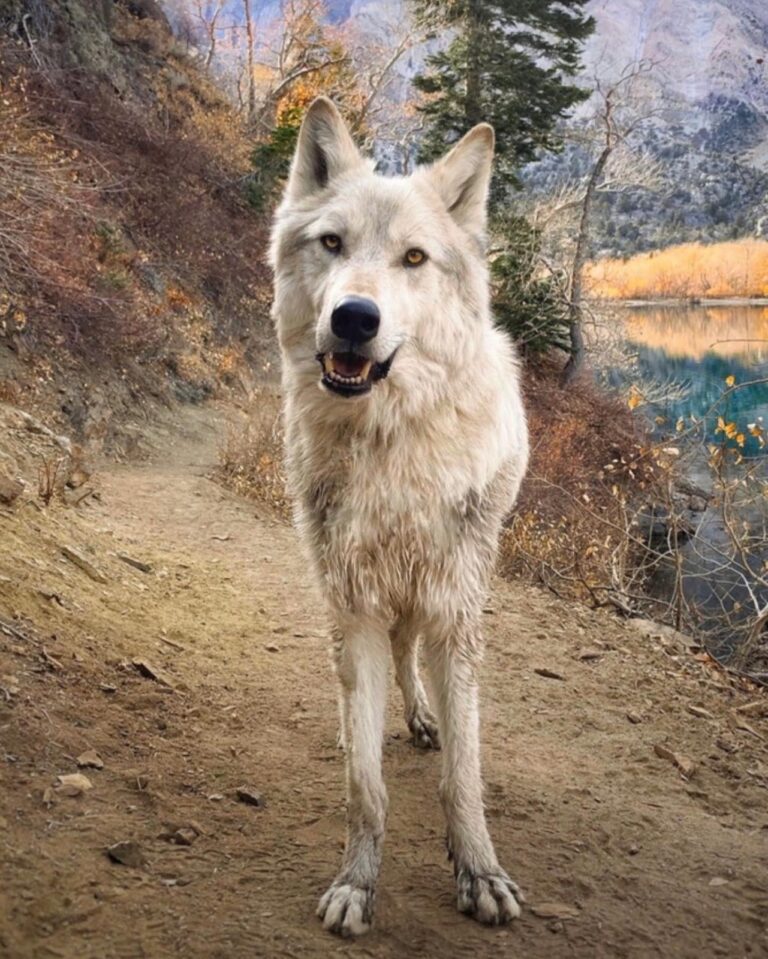
Archer was a high-content Wolfdog hybrid with timber wolf (gray wolf) and Alaskan Malamute parentage. Both of Archer’s parents were Wolfdogs, and neither was full Malamute or full wolf. Unfortunately, Archer passed away in 2021 at age five, but he had an amazing life with humans who made his life rich and joyful.
3. Wayla
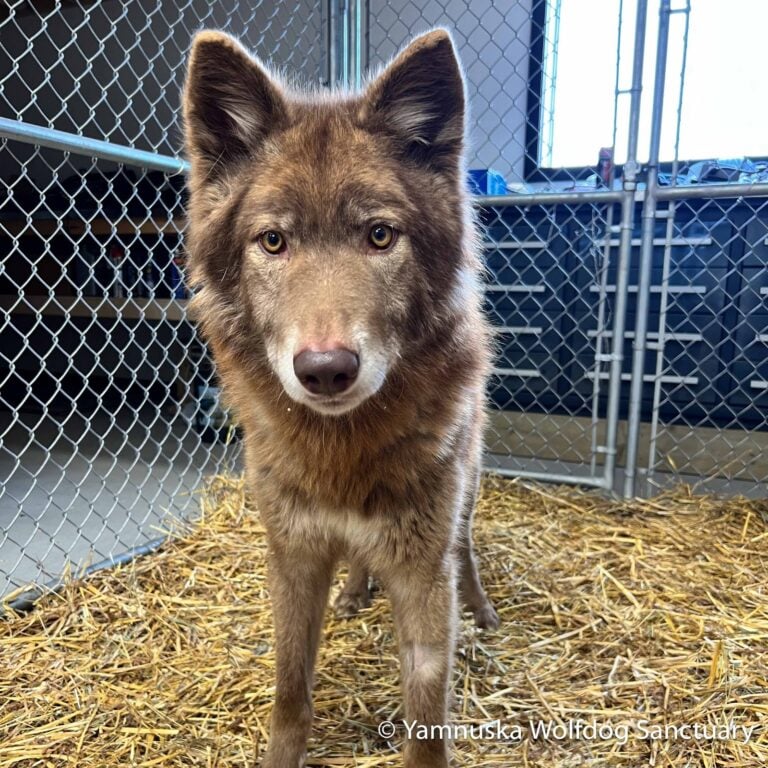
Wayla is a beautiful five-year-old low-content Wolfdog living at Yamnuska Wolfdog Sanctuary in Alberta, Canada. Miss Wayla is described as confident, but she doesn’t like to be pet or handled. She will come up to give staff a sniff, and she is always on the hunt for treats, but she wouldn’t make a good pet despite her low wolf content.
4. Tiberius

If you were wondering whether Wolfdogs are big, just look at Tiberius! He’s being held by a full-grown adult and he almost completely covers her body with his. Tiberius is a mid-content Wolfdog with a DNA-test confirmed 68.5% wolf content, though W.O.L.F. Sanctuary (a Colorado Wolfdog sanctuary) warns that “not all DNA tests or Laboratories are equally accurate.” Tiberius gets to live the ideal Wolfdog life in rural Oregon with other Wolfdogs and Shepskies.
5. Antoine

Antoine (right) is a seven-year-old low-content Wolfdog who lives at Wild Spirit Wolf Sanctuary in New Mexico. Antoine was owned by two separate families, and finally came to Wild Spirit after it became clear that re-homing him wouldn’t be the solution. Antoine was unpredictable, particularly on leash, and would even lash out to try to bite his humans.
Luckily, Wild Spirit Wolf Sanctuary knew exactly what Antoine needed to be happy and confident, and they describe him as a “sweet and social boy” who has not shown any signs of aggression towards humans since settling into his new home. Here you can see him with another low-content Wolfdog at the sanctuary named Thistle (left).
Who Should Own a Wolf Dog? Challenges & Considerations
Owning a Wolfdog is different from owning a traditional domestic dog breed. Even the most “intense” breed of dog won’t prepare you fully for Wolfdog ownership, and most Wolfdogs who need to be re-homed or sent to sanctuaries come from underprepared pet owners. Some experts say that domestic dogs are to wolves what puppies are to adult dogs, which illustrates why so many Wolfdog owners are baffled by the intensity of their hybrid companions.

Most people should not own a Wolfdog. Wolfdogs are not inherently dangerous, but their behavior can be more unpredictable than domesticated dogs, and a strong independent mindset combined with innate survival instincts makes Wolfdogs tough to redirect. Wolfdogs are also fairly solitary, enjoying only one or two companions, and may be fearful or avoidant of new people, things and experiences. Socializing with a Wolfdog isn’t easy, and can trigger reactivity.
Many of the challenges of Wolfdog ownership have nothing to do with the personality or temperament of the Wolfdog itself, but the logistics of keeping one safely. Many veterinarians refuse to treat Wolfdogs, and finding one that will can be expensive. Similarly, feeding a Wolfdog can be very expensive, and their diet consists primarily of raw meat and bone. Containing a Wolfdog while still giving them ample space to exercise is yet another challenge, especially since Wolfdogs are notorious escape artists. Want to go on vacation? Good luck finding a kennel or doggy hotel to keep your Wolfdog for the weekend.
All things considered, Wolfdogs don’t make good pets for people who like social, easy-going family dogs. Before searching for Wolf Dog puppies for sale in your area, be sure you are fully educated on Wolfdog ownership and laws regarding these animals in your area. Unfortunately, reports suggest that around 90% of Wolfdogs are euthanized by age two due to irresponsible ownership.
Is It Legal To Own a Wolfdog In The United States?
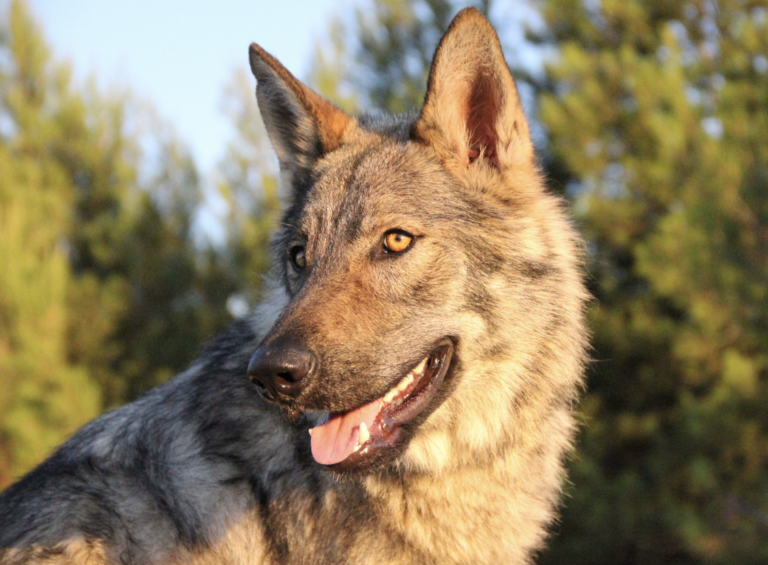
It is not legal to own a Wolfdog in every state, and states that allow Wolfdog ownership typically have strict regulations for their care and keeping. In states where possessing a wolf dog mix is illegal, penalties may include fines, confiscation of the animal, and even euthanasia. Some states restrict private ownership but allow sanctuaries and licensed rehabilitators to keep Wolfdogs.
Consult this guide to state regulations on Wolfdogs and be sure to reach out to your local government for more specific regional information.
Varieties of Wild Wolf Hybrid Dog Breeds
There are several types of wolf dogs with unique names, established breeding standards, and easily traceable heritage. The ubiquitous Wolfdog most people know has no official name, and is not registered with the American Kennel Club or any kennel clubs for that matter. Because Wolfdogs have a high non-domestic dog genetic content, they cannot be registered as an official breed of dog.
Let’s take a closer look at the most well-known wolf dog breeds starting with the generic Wolfdog.
Wolfdog

The name “Wolfdog” is used to refer to a dog with both gray wolf (Canis lupus) and domestic dog (Canis lupus familiaris) parentage. Wolfdogs can be a hybrid of a different wolf species or subspecies, but the most common wolf variety is the gray wolf, also known as the timber wolf.
Typically weighing in between 70–120 pounds, Wolfdogs are large, and those whose domestic dog parents were working dogs tend to be the largest and most common. Most Wolfdogs are some combination of wolf, German Shepherd, Alaskan Malamute, and/or Siberian Husky, though other mixes also exist.
Czechoslovakian Wolfdog
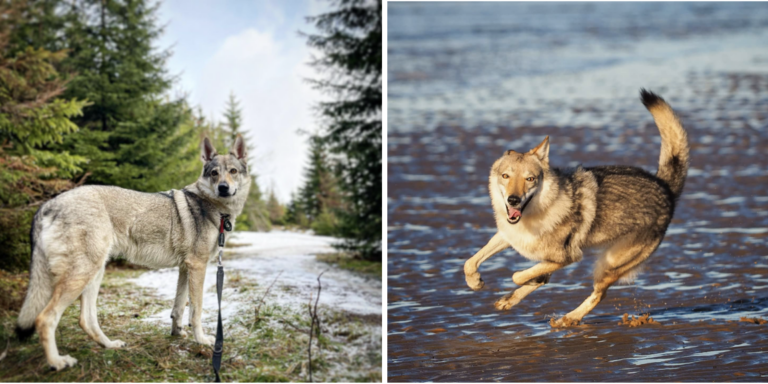
Czech Wolf Dogs—also called Czechoslovakian Vlciak—are a one of several standardized wolf hybrid dog breeds. Developed during a 1958 experiment, Czechoslovakian Wolf Dogs come from a line of German Shepherds that were bred to Eurasian wolves (Canis lupus lupus), a subspecies of the gray wolf. It is estimated that today’s Czech Wolfdogs are 6.25% pure wolf and 93.75% German Shepherd, but their wolf content could be as high as 30%.
Significantly smaller than Wolfdogs, Czechoslovakian Wolfdogs stand 23–26 inches tall and weigh 44–57 pounds.
Saarloos Wolfdog

Developed in 1935 by Dutch zoologist Leendert Saarloos, the Saarloos Wolfdog is a cross of German Shepherd and Eurasian wolf, similar to the Czech Wolfdog. The same study that claims Czech Wolfdogs could be as much as 30% Eurasian wolf found that Saarloos Wolfdogs possess 18–33% wolf ancestry.
Standing around 24–30 inches tall and weighing up to 100 pounds, Saarloos Wolfdogs are larger than Czech Wolfdogs but smaller than the ubiquitous Wolfdog with more recent wild wolf ancestry.
5 Domestic Dog Breeds That Look Like Wolves
You don’t have to own an actual wild wolf to own a dog that looks like a wolf! Here are five dog breeds that look like wolves but have zero wolf content. These dogs are all double coated and have wolf-like coloring that makes them look so much like wolves that some unethical breeders will even miss-advertise these breeds as wolfdog hybrids.
1. Alaskan Malamute

Quick Facts:
- Height: 23–25 inches
- Weight: 75–85 pounds
- Lifespan: 10–14 years
- Breed Group: Working group
- Country of Origin: United States, Alaska
2. Kunming Dog
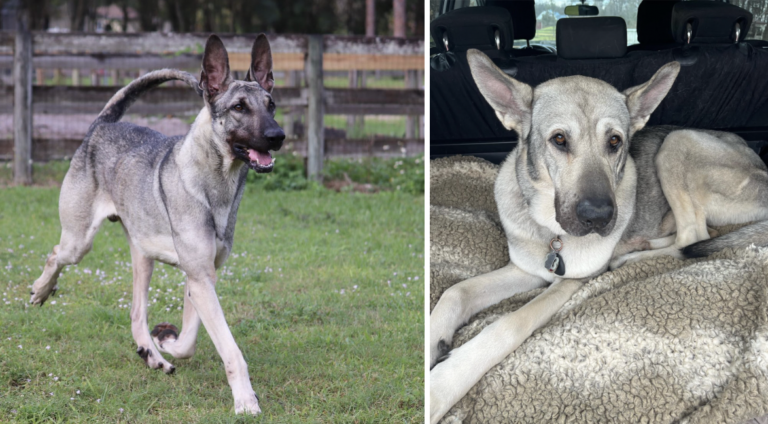
Quick Facts:
- Height: 23–30 inches
- Weight: 66–84 pounds
- Lifespan: 12–14 years
- Breed Group: Working group
- Country of Origin: China
4. Siberian Husky

Quick Facts:
- Height: 20–23.5 inches
- Weight: 35–60 pounds
- Lifespan: 12–14 years
- Breed Group: Working group
- Region of Origin: Siberia
5. Swedish Vallhund
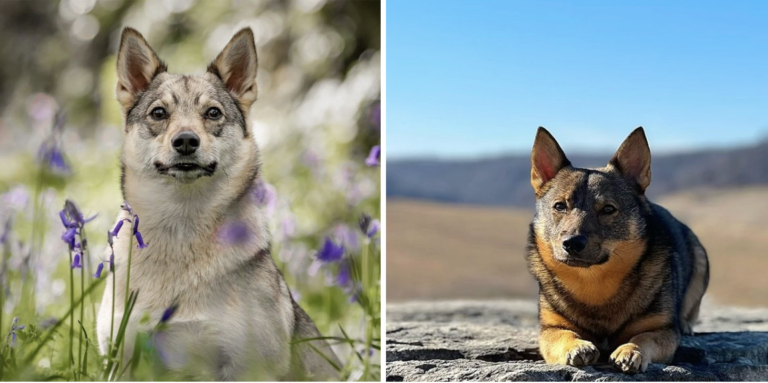
Quick Facts:
- Height: 11.5–13.75 inches
- Weight: 20–35 pounds
- Lifespan: 12–15 years
- Breed Group: Herding group
- Country of Origin: Sweden
6. Tamaskan
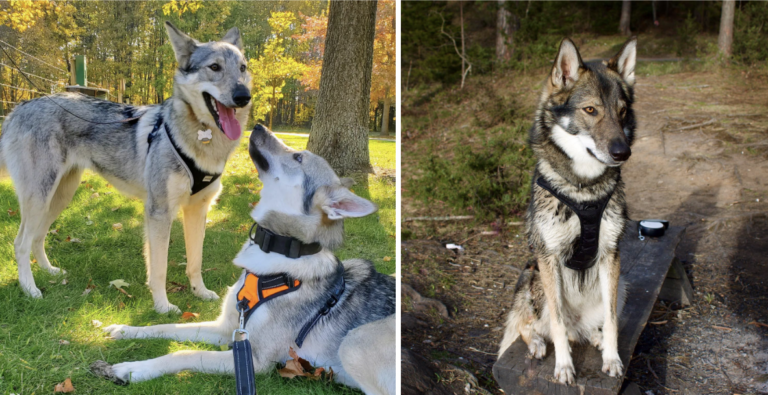
Quick Facts:
- Height: 24–33 inches
- Weight: 55–95 pounds
- Lifespan: 12–15 years
- Breed Group: Working group
- Country of Origin: Finland
Wolf Dog FAQ
Learn more about Wolfdogs with answers to the most common question about these canid hybrids!
What is the difference between a Wolfdog and a Wolfadoodle?
A Wolfdog is a hybrid mix of wild wolf and domestic dog. A Wolfadoodle is an Irish Wolfhound Poodle mix. Irish Wolfhounds do not have recent wolf ancestry, and their name doesn’t point to any wolf heritage. Irish Wolfhounds were once used to hunt wolves, giving them their name, but they aren’t part wolf.
An Irish Wolfhound cross Poodle is called a Wolfadoodle, and you might be able to find one if you work with an Irish Wolfhound rescue! Irish Wolfhound adoption can be a lengthy process, since these dogs have very particular needs, but they are nowhere near as high-maintenance as Wolfdogs!
How do I know if my Wolfdog actually has wolf ancestry?
Approximately 75% of all so-called Wolfdogs in the United States have no wolf ancestry. This can sometimes be a simple mistake, but many advertisements for Wolfdog or wolf puppies for sale are deliberate scams. Because there are domestic dog breeds that look very similar to wolves, some unethical breeders mis-advertise domestic dog puppies as wolf hybrid puppies to increase profit. The best way to verify it would be to get a DNA Test.
DNA tests are the most reliable way to confirm whether or not your Wolfdog is actually part wolf.
Can Wolfdogs live with small animals?
It’s not recommended. Wolfdogs have a higher prey drive than the average domestic dog, and are more likely to chase or attack small animals in the home and even wild animals. Seasoned Wolfdog owners and sanctuary staff do not recommend Wolfdog ownership if you own small animals, including small dogs.
Where can I find a Wolf Dog for sale?
I don’t recommend purchasing a Wolfdog. While it might be tempting to snag one of those adorable Wolfdog puppies, very few people are equipped to be Wolfdog owners. If you really want a Wolfdog, buy a domestic dog breed that looks like a wolf instead!
Remember that if you see a wolf hybrid for sale or a wolf for sale, there’s a good chance it’s not actually a wolf. It’s a lot of work to breed dogs and even more work to work with wild animals to create hybrids. Most “Wolfdogs” aren’t actually Wolfdogs, and it’s very common for people to get scammed.

